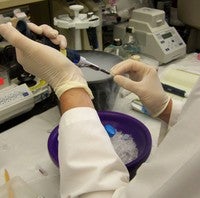Clinical Trials
 More information on allergy-related clinical trials here.
More information on allergy-related clinical trials here.
The following clinical research protocols within the Asthma and Allergic Diseases Center are recruiting subjects.
Immune and Molecular Mechanisms in Aspirin-Exacerbated Respiratory Disease (AERD)
Principal Investigator: Larry Borish, MD
We are investigating the role of cysteinyl leukotrienes and cytokines in the development of aspirin-exacerbated respiratory disease (AERD). We hypothesize that cysteinyl leukotrienes and other arachidonate metabolites promote eosinophil, fibroblast, and fibrocyte proliferation, secretion of proinflammatory cytokines, and the aggressive remodeling characteristic of asthma, sinusitis, and nasal polyposis. Concentrations of cysteinyl leukotrienes (CysLTs) and their receptors are significantly higher in tissue obtained from subjects with AERD than in subjects with aspirin-tolerant asthma or a healthy airway. AERD is characterized by upregulation of CysLT synthesis pathways and CysLT receptors, including novel receptors that are targeted by CysLTE4, occurring concomitantly with downregulation of PgE2 synthesis (cox2 and mPGES1) and responsiveness (EP2) pathways. These aberrations are controlled by cytokines, including IL-4 and IL-13, acting through the transcription factor pStat6, but AERD is also characterized by prominent expression of IFN-γ. Therapeutic aspirin desensitization functions, at least in part, through blocking gene transcription mediated through diminished expression of pStat6 in the nucleus.
Our current studies emphasize the role of CysLTs acting through this putative CysLTE4 receptor pathway, particularly on eosinophils and aberrant signaling mechanisms involving PgE2. These studies involve transcriptome screening, proteomics, and genome-wide searches to identify unique molecular pathways responsible for developing aspirin-exacerbated respiratory disease. For information on enrolling in this clinical trial, please contact MarthaJoy Spano at 924-1278.
CD4+ and CD8+ T Cell Dependent Mechanisms of RV-induced Asthma Exacerbations
Principal Investigator: Larry Borish, MD
The greatest morbidity associated with asthma is the occurrence of severe, potentially life-threatening exacerbations. Rhinovirus (RV) accounts for ~60-70% of childhood and adolescent asthma exacerbations. Although an exacerbation would be predicted whenever a cytopathic inflammatory response is superimposed upon the asthmatic lung, this is not what is observed – and only RV infections are consistently associated with asthma exacerbations. RV-associated asthma exacerbations are linked to the presence of an increased type 2 cytokine signature (IL-4, IL-5, and IL-13), and one explanation is that these cytokines are being produced by the RV-specific T cells themselves, either CD4+ helper (Th2-like) or CD8+ cytotoxic (Tc2-like) T lymphocytes. We propose that this inflammatory response produced by T lymphocytes is harmful to the host. Exacerbations are also linked to the diminished expression of the anti-inflammatory cytokine IL-10. IL-10 may provide feedback to control the collateral damage associated with an exuberant T-cell response. We believe the source of this IL-10 during infection is also likely the effector T-cells.
Our studies currently focus on the production of type 2 cytokines and IL10 by RV-specific effector T-cells to determine whether there is a correlation between Type 2 Cytokines and /or IL-10 and the development of increased upper and lower airway inflammation following RV infection. We hypothesize that RV-specific T cells from subjects who develop an exacerbation of their upper and lower airway inflammation during RV infection release higher levels of type 2 cytokines and/or lower levels of IL-10. We infect asthmatic volunteers with RV and identify circulating RV-specific CD4+ helper and CD8+ cytotoxic T effector lymphocytes for these studies. For information on enrolling in this clinical trial, please contact MarthaJoy Spano at 924-1278.
